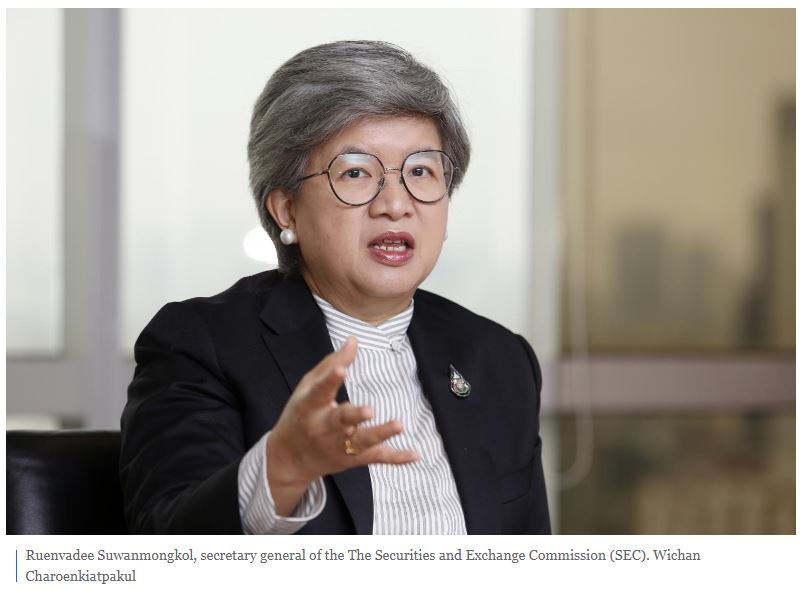Thailand: Setting a digital agenda
The Securities and Exchange Commission (SEC) is putting cryptocurrencies and digital assets on the top of its agenda this year, urgently seeking a concrete direction for the regulation of emerging assets in an effort to support skyrocketing trade volume and to protect lawful users and the public.
The SEC plans to raise these issues at what it calls a “retreat session” with the board of directors, scheduled for the second quarter this year to discuss the country’s digital asset ecosystem, including perspectives from exchange operators and traders to develop a mandate and directions for regulatory amendments, said SEC secretary-general Ruenvadee Suwanmongkol.
With bitcoin’s price surpassing US$50,000 this month, it resulted in an influx of trading in Thailand. Around 500,000 investors are trading in digital assets, a figure that has increased rapidly over the past 3-4 months.
Comparatively, there are 3 million investors trading on the Stock Exchange of Thailand, which has operated for 46 years.
“Cryptocurrency investors nowadays have changed from those 1-2 years ago, and now there are many younger investors entering this market,” Miss Ruenvadee said.
Young investors interested in cryptocurrency may have little experience in this alternative investment, she said. Another concern is high risk from volatile price fluctuation without fundamentals supporting the price.
In addition, Thailand cryptocurrency exchange operators are small players with little capital reserves.
Cryptocurrency trading turnover has grown rapidly to 130 billion baht as of Feb 8, 2021.
“Fortunately, we learned a very good lesson from BX, the country’s former top crypto exchange that shut down,” said Miss Ruenvadee. “We found exchanges should clearly separate hot wallet [cryptocurrency accounts that are connected to the internet] and cold wallet [typically not connected to the internet] accounts, and have the private key deposited with a third party to allow customers to track assets if the exchange has shut down, especially for non-Thai exchange owners.”
In addition, the SEC plans to require digital exchanges to follow know-your-customer measures when onboarding new users.
Investors must also conduct suitability tests to assess risk tolerance prior to investing in digital assets — the same as with securities trading.
“Digital exchange operators need to record the profiles of those investing in cryptocurrencies, including age, gender and job to analyse who is investing in these digital currencies,” she said.
“The most important point is investors should have savings; they should not be borrowing money for investment. Investors must accept their investments could lose money, and not be lured by the ability to gain.
“Young people should devote their time to learning in the professional field and, if interested in crypto investment, they should gradually study and invest carefully.”
The SEC is also preparing to amend the Digital Asset Decree, especially regarding initial coin offering (ICO) funding to address regulatory arbitrage issues.
At present there are seven digital exchange operators, five brokers, one dealer, and four ICO portals.
The SEC oversees regulatory compliance and enforces both the Securities and Exchange Act and the Digital Asset Decree.
The regulator wants to eradicate overlapping areas between the two laws that can lead to regulatory arbitrage.
“Amendments usually take time, therefore we have to look forward and prepare in advance for future changes,” said Miss Ruenvadee.
The SEC expects by the first quarter this year, guidelines on the issuance of real estate-backed tokens will be announced and its ICO will be regulated under the Securities and Exchange Act, instead of the Digital Asset Decree, which offers higher levels of protection to investors.
She said the SEC is preparing to discuss the future of the financial landscape with the Association of Thai Securities Companies, consisting of 43 fund management firms.
Source: https://www.bangkokpost.com/business/2070843/setting-a-digital-agenda


 Thailand
Thailand




